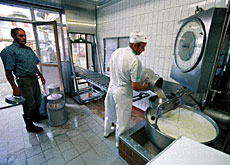Local cheese dairies face threat of closure

Nine out of ten local cheese dairies face the threat of closure, according to a recent study into the state of the Swiss cheese industry.
But speciality cheese producers have defended their territory and denied they are at risk from industry consolidation.
The report, commissioned by the Fribourg-based dairy plant, Cremo, and cited in Thursday’s edition of the Swiss newspaper, “Blick”, suggests that some 955 independent cheese producers are likely to fold over the next few years.
Explaining the need for a drastic restructuring of Switzerland’s local cheese industry, Ernest Schläfli – a board member at Cremo – said consumers were shunning locally produced speciality cheeses in favour of cheaper products.
“Consumer habits have changed a great deal,” Schläfli told swissinfo, “and young children can now say the word ‘McDonalds’ before they can even say mummy or daddy.”
Figures rejected
But Anton Schmutz, director of Fromarte – the umbrella organisation representing Swiss specialist cheese producers – rejects the findings of the study as well as the conclusion that consumer spending on cheese is motivated solely by price.
“[This study] is only showing a theoretical number of closures,” Schmutz said in an interview with swissinfo.
“Of course we have to adapt our production to the consumers… but I think the market will decide if the small cheese producers have a future or not, and not a study written by someone sitting in an office,” he added.
Christophe Darbellay, vice director of the Federal Office for Agriculture, also questions the report’s findings.
“I think the results of this study are exaggerated,” Darbellay told swissinfo.
“In my opinion, there will be an evolutionary process whereby a certain number of speciality cheese makers will disappear, but to say that nine out of ten will go under is frankly an exaggeration.”
The report comes just eight months after Franz Meier, president of Emmentaler Switzerland, issued a warning that half the country’s cheese makers would go under by 2010.
The Swiss cheese industry was dealt a major blow three years ago, when the government introduced a 1999 package of agricultural reforms which led to the scrapping of the Swiss Cheese Union.
The union had for 85 years bought every kilo of Emmentaler, Gruyère and Sbrinz cheese at a guaranteed price.
Collaboration or consolidation?
Schmutz says he recognises that the industry is undergoing an unprecedented period of upheaval, but argues that small-scale cheese producers are ready to adapt to the demands of the new market.
“Of course we have to adapt our structures to the new market and the last two or three years have seen great changes, but I still think there will be more than 500 small cheese factories.”
Schläfli believes specialist cheese producers – the majority of whom live in rural communities and whose livelihoods depend on the long-term survival of the industry – will only be able to guarantee their future if they pool their resources.
“Two or three small cheese makers should come together to offer their specialist products,” comments Schläfli.
Fromarte’s director agrees that more independent cheese producers are likely to solicit partnerships with other small-scale manufacturers in the future.
“The future is in two or three small cheese factories coming together to create a new company…this is one way of becoming successful,” Schmutz says.
Need for promotion
Schmutz recognises the problems facing small cheese producers who are being forced to trade on an increasingly open – and fiercely competitive – market.
Fromarte believes one way of shoring up the future of Swiss specialist cheese producers is to boost efforts to promote their products outside the country.
“For the most part, we export mostly [big-name cheeses] like Emmentaler, Gruyère and Appenzeller. But we have to find new markets for our regional and speciality cheeses, which are not very well known abroad,” Schmutz says.
A step in the right direction, argues Schmutz, came this week when Switzerland took 15 medals – five gold, five silver and five bronze – in an inaugural Olympic Games of Mountain Cheeses, which took place in Valle d’Aosta, Italy.
A number of specialist Swiss cheeses were singled out for commendation by judges at the Games.
“This shows we can do a good job, and what we have to do now is tell the consumer.”
swissinfo
Small cheese producers are under increasing pressure to consolidate or go under as the domestic market shrinks in size.
Some industry insiders believe it is only a matter of time before nearly 1000 small, speciality cheese producers are driven out of business.
Earlier this year, the federal office for agriculture said that around 30 per cent of Switzerland’s farms are not making enough money to survive.

In compliance with the JTI standards
More: SWI swissinfo.ch certified by the Journalism Trust Initiative










You can find an overview of ongoing debates with our journalists here . Please join us!
If you want to start a conversation about a topic raised in this article or want to report factual errors, email us at english@swissinfo.ch.